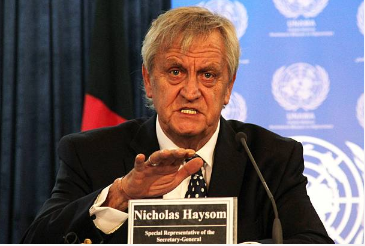The Special Representative of the Secretary-General and head of the United Nations Mission in South Sudan (UNMISS) on Thursday warned of disruption of South Sudan’s elections which are scheduled by predicted flooding as water levels in Lake Victoria, a source of the Nile, reached a record high.
Nicholas Haysom made sounded the warning while addressing the Reconstituted Joint Monitoring and Evaluation Commission (RJMEC) plenary Reconstituted Joint Monitoring and Evaluation Commission (R-JMEC) at the Beijing Hotel in Juba. He said flooding might affect security as the country prepares for the conduct of the first-ever elections in December.
“We are further concerned by reports of anticipated floods given the rise in the Nile waters. This has implications for accessibility to communities as the country prepares for elections, and the overall security situation because of its impact on grazing and agriculture resources,” he said. “I encourage the Transitional Government to reinforce its disaster preparedness plans and allocate sufficient resources to mitigate the impact on its citizens. I also call on the international community to support efforts towards saving innocent lives.”
Haysom also said UN Secretary-General António Guterres wrote to the effect that South Sudan has not met the preconditions for credible elections.
“While recognizing the sovereign prerogative of South Sudan to make decisions about its elections, the Secretary-General’s letter, in line with the observations of IGAD, AU, and RJMEC, concluded that the necessary conditions as agreed upon by the parties themselves in the R-ARCSS had not been achieved on several fronts,” he said. “It (letter) further encouraged the parties to commit to take urgent steps to collectively agree a “critical mass” of implementation requirements necessary for peaceful, free, fair, and credible elections.”
He also said that while the Strategic Defense and Security Review Board’s report has been finalized, the partial financing of the technical electoral bodies, and the steps taken on the Transitional Security Arrangements, the fact is over the last few months marginal progress has been recorded.
Haysom highlighted that the inter-party dialogue process which commenced last month to find consensus on how to approach the end of the transitional period appears to have stalled and given way to the ongoing Tumaini Initiative in Nairobi.
“While I am encouraged that the Tumaini Initiative has brought into being the Declaration of Commitment signed on 16 May, with seven months remaining before elections, it is critical that the parties find a working formular that gives required attention and impetus to both processes,” he stated.
The UNMISS chief said he remains concerned about the prevailing dire humanitarian and economic conditions in the country.
“An estimated 7.1 million people are experiencing high levels of acute food insecurity mostly in locations affected by climate-related shocks, economic crisis, and conflict, according to the Integrated Food Security Phase Classification (IPC),” he said. “Meanwhile, only 13.5 percent of the US$1.8 billion required for the Humanitarian Needs Response has been received as of 20 May.”
Haysom stated that the humanitarian situation was unnecessarily compounded by the imposition of taxes on trucks carrying fuel and other supplies to UN humanitarian, development, and peacekeeping operations.
The UMISS head also said the Sudan conflict continues to negatively affect the humanitarian situation in South Sudan and creating new economic and security risks.
He also noted that the persistent subnational violence is also negatively affecting civilians and undermining the government’s ability to give due attention to nation-building efforts.
“On our part, the United Nations will continue to support local peace initiatives. We continue to monitor the situation in Tambura and Kapoeta and in this connection, we have already reinforced our operating bases to protect civilians following the outbreak of violence. I also acknowledge the efforts exerted by the government towards restoring calm to the restive town of Tambura and its environs,” Haysom said. “I want to emphasize the urgency needed to implement the provisions of the Revitalized Peace agreement given the brewing perfect storm (economic, humanitarian, and climate change factors). Further delays could undermine the progress that has been achieved thus far.”
“I wish to underscore that as matters stand, the Revitalized Peace Agreement remains the only route towards enduring peace in South Sudan. The United Nations, with its Trilateral partners (IGAD and AU) in concert with RJMEC, is committed to supporting and working with the South Sudanese parties to build the foundations of democracy, good governance, peace, and stability,” he concluded.




